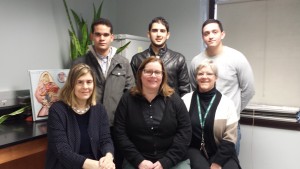
Top row, L to R: David Belloso ’15, Sherif Elkattawy ’15 and German Rojas ’15; Bottom row, L to R: Laura Twersky, Ph.D., Jill Callahan, Ph.D., and Frances Raleigh, Ph.D.
Beta Beta Beta (TriBeta), the National Biological Honor Society awarded research grants to six Saint Peter’s University students for the 2014-2015 academic year. Since 1998, TriBeta has awarded grants to more than 30 undergraduate research projects involving more than 50 students. Saint Peter’s students have used the funds to conduct biological studies ranging from the effects of cell phone radiation to the antibacterial properties of coconut oil in relation to tooth decay.
“It’s a big endeavor on the students’ part,” said Professor of Biology Laura Twersky, Ph.D. In addition to submitting a competitive grant proposal, students spend long hours preparing and conducting experiments. “It presents a whole range of opportunities,” Dr. Twersky continued. “Students are funding their own work at an undergraduate level which is pretty unusual.”
David Belloso ’15 and Sherif Elkattawy ’15 whose research advisor and collaborator is Assistant Professor of Biology Jill E. Callahan, Ph.D., received funding to research the effects of coconut and virgin olive oil soaps on the biofilm inhibition of Staphylococcus aureus, a common pathogen that can cause skin infections and food poisoning.
“There are a lot of medications that have side effects in treating staph infections,” said Elkattaway, who is applying to medical school. “We wanted to test the effect of natural ingredients on the pathogen.” The duo established the method to test the premise (the oils didn’t dissolve in initial experiments and the team worked with the chemistry department to create oil based soaps that proved conducive to experimentation) and is now testing the threshold and optimal PH level for inhibition.
German Rojas ’15, too, is investigating the effectiveness of natural remedies in reducing acne. Rojas, whose research advisor/collaborator is Professor of Biology Frances S. Raleigh, Ph.D., said the experience has been especially valuable since dermatology is an area he is considering after graduating from Saint Peter’s. The collaboration with faculty members and undergraduate researchers is also beneficial. “You work very closely with like minded people headed toward the same path and career goals,” he noted.
Jereena Varghese ’15 received funding to study the effects of nutrition, specifically anti-oxidants, on delaying or preventing cataracts. The honors biology student, whose research advisor is Dr. Twersky, determined a method and timeframe for inducing cataracts in tadpoles during the first phase of research. In the second phase, Varghese is testing possible synergistic interactions of combinations of the antioxidants lutein, lypocene and vitamin E to determine any positive effects on the progression of cataracts. “Finding a way to delay cataracts surgery would be a significant contribution to science,” she said.
Tribeta grants were also awarded to Mackenzie Sylvester ’15 to study the effects of bacterial intrusion of E.coli, her research advisor/collaborator is Dr. Twersky, and to Nathalie Staiger ’15, whose research advisors and collaborators are Drs. Raleigh and Twersky.
In addition to writing and defending their Honors Theses, the undergraduate researchers will present their findings to the New Jersey Academy of Science in April. The opportunity to conduct original research has bolstered their applications to medical school and graduate programs and opened their eyes to different career paths. Varghese, who is applying to optometry school, envisions a future where she will care for patients and conduct clinical research or product trials. I don’t want a static career,” she said. “With research, I can do more than one thing.”
